THCA stands for Tetrahydrocannabinol Acid. It is beneficial due to its healing and natural properties, some of THCA benefits are discuss below: THCA is under the category of non-psychoactive cannabinoids found in a raw cannabis plant. It acts as a precursor for THC, which is a molecule also named as tetrahydrocannabinol, responsible for the psychoactive effect of the plant.
What is THCA?
THCA stands for Tetrahydrocannabinol Acid, a non-psychoactive cannabinoid extracted from raw and live cannabis plants. It is also referred to as the chemical precursor of THC, better known as Tetrahydrocannabinol responsible for psychoactive properties in cannabis.
A whole lot of THCA exists in fresh, unheated cannabis. Partial decarboxylation into THC due to its nature as an acidic cannabinoid happens upon application of heat. This usually occurs through various processes accompanying smoking, vaping, or cooking cannabis.
Consider Reading: 10 Strongest THCA Flowers
This also won THCA a great deal of attention due to its medicinal value. It is under study for anti-inflammatory and neuroprotective properties, as an antiemetic, and even possibly anticarcinogenic.
Unlike THC, this acid does not get users “high” since it doesn’t easily bind to cannabinoid receptors in the brain. Due to the huge health benefits that it promises without psychoactive side effects, many people consume cannabis medicinally either through smoking raw cannabis or through THCA-rich products.
What does THCA do to the body?
THCA is raw, non-psychoactive acid cannabis. On itself, it does not get one as high as THC, though its therapeutic potential most definitely has much to be excited about.
Consumed THCA has been touted for its modulation of inflammation, pain, and immune function by inhibiting the endocannabinoid system. Anti-inflammation, neuroprotection, antiemetic properties, and assistance in managing pain, muscular spasms, arthritis, among other conditions, have also been put forward for THCA.
Basically, it needs heating and decarboxylation for the substance to become psychoactive THC. In its juice or tinctures form, it is raw and maintains properties. Some recent research that has come out really shows possible use in treating epilepsy and neurodegenerative diseases, but this will take more study to be confirmed.
Interest in the medicinal properties of THCA continues to grow sans intoxicating effects of THC.

Does THCA Get You High?
Rather, THCA is the tetrahydrocannabinolic acid-non-psychoactive cannabinoid detected in raw and live cannabis. Unlike THC, it does not produce that “high” which is normally connected to the use of marijuana. It is for this reason that THCA does not bind too well with the CB1 receptors of the brain.
This becomes psychoactive when this THCA undergoes heating-smoking, vaping, or cooking-and converts to THC. Generally speaking, THCA in itself will not have psychoactive properties, but in the case of transformation into THC, it should be so. Most describe that THCA is anti-inflammatory too: a few studies have described that THCA may decrease inflammation. As such, it is useful in disease states, including arthritis and autoimmune diseases.-
10 THCA Benefits
Below is the comprehensive list of THCA Benefits:
- Anti-inflammatory: It repressed the inflammatory activities, even at high potency levels. This will be quite important in the case of those patients who are suffering from inflammatory diseases such as arthritis and lupus apart from autoimmune diseases. Symptomatic alleviation of discomfort and pain may complement this antiinflammatory action.
- Neuroprotective Effects: Initial studies postulate that THCA may exert a neuroprotective effect that could be useful in neurodegenerative diseases such as Alzheimer’s, Parkinson’s, and multiple sclerosis. In these instances, THCA gives a protective function to the brain against oxidative stress and inflammation, which have been implicated to cause cognitive decline.
- Antiemetic-releasing nausea: THCA is known to be potent in reducing nausea and vomiting. Thus, of great value to patients undergoing chemotherapy treatment or those that feel very strong sensations of nausea on account of chronic disease. THCA might act as a replacement for conventional anti-nausea medicine.
- Appetite Stimulator: Like THC, it’s capable of stimulating appetite. That would be helpful in people who have diseases leading to loss of appetite, such as cancer and HIV/AIDS. Unlike THC, though, THCA does not contain the psychoactive properties within, and just for that fact, the substance is popular among those who avoid that feeling of being “high”.
- Anti-proliferative properties or anti-cancer potentials: Most early studies have pointed to the capability of THCA to inhibit the proliferation of some cancer cells. Though further studies are yet to be done, this property indicated that it might be researched as an adjuvant therapy in the treatment of cancer.
- Analgesia: THCA shows analgesia; the psychoactive side effects attributed to THC are, however, significantly less; hence, it may be utilized in a number of chronic pain conditions that cannot afford the generation of intoxication.
- Immune System Support: THCA reduces the level of inflammation and modulates immune responses for a healthier immune system. This may help in autoimmune diseases or weakened immune defenses.
- Antispasmodic: There are claims that THCA reduces muscle spasms and cramps; hence, it can be of benefit in conditions like multiple sclerosis and fibromyalgia. Generally speaking, antispasmodic action upon muscles may become helpful in inducing the relaxation of all muscles.
- Antioxidant Activity: The antioxidant nature of THCA combats the oxidative stress associated with a number of chronic diseases and overall aging. It is in this respect that it forms part of a wider cellular health and reduced risk of chronic diseases.
- Gut health: The most important role of THCA is anti-inflammatory inside the GI tracts, which would enable better digestion and comfort for the sufferers from inflammatory bowel diseases, including Crohns and colitis.
These benefits showcase the support for THCA as a medicine, although much more research is to be done yet for complete understanding of its overall effects and applications.
How to Consume THCA Cannabis?
THCA cannabis is consumed with considerations that this cannabinoid acts contrary to the considerations of THC. It is described as non-psychoactive cannabis. Its ways of consumption for possible therapeutic benefit include;
- Raw Cannabis Consumption
Juicing: The two major ways of availing THCA are juicing raw cannabis leaves and buds. This way, retention of the THCA content with anti-inflammatory and neuroprotective properties is possible.
Mask the taste of the plant by putting some raw cannabis leaves or small pieces of raw buds into your smoothie.
- Tinctures and Oils
Raw THCA Tinctures: it is an extract from non decarboxylated cannabis; hence, it has not undergone the action of heat. One usually administers a couple drops of this under his or her tongue or mixes with favorite drinks.
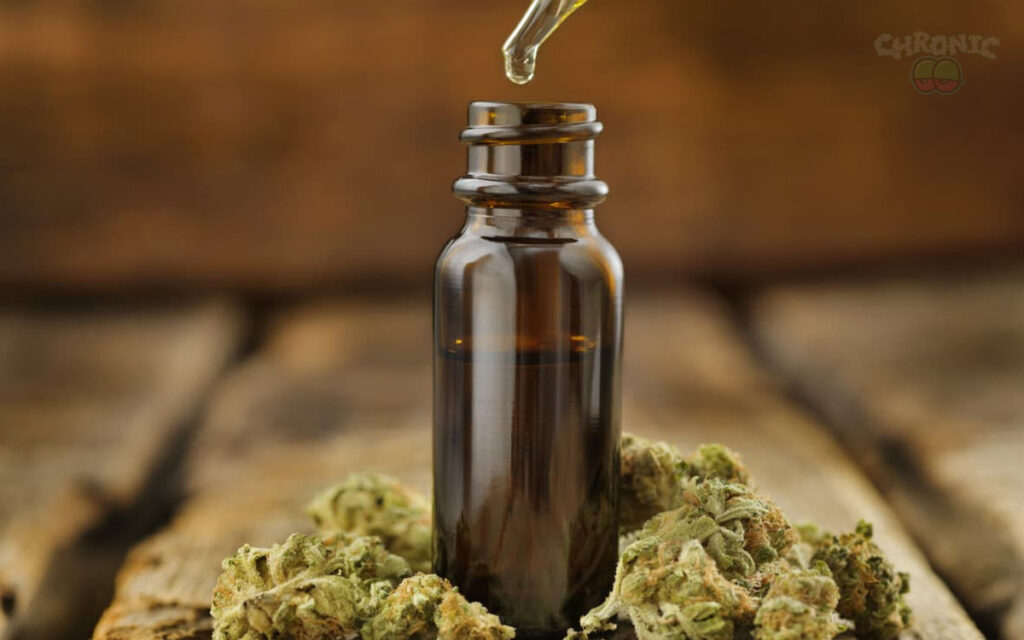
- THCA Capsules
Supplement Form: this form of presentation is very effective because an individual does not need any kind of preparation for the drug to be absorbed into their body.
- Topicals
THCA Topicals: These come in the form of either cream or balm applications. These have been used for topical use and providing relief locally to pains/inflammation.
- Raw Cannabis Edibles
Salad and Dressings: One can chop up raw cannabis onto the salads or add it into salad dressings if the THCA is kept unheated.
THC vs THCA
While both are cannabinoids produced by cannabis, THC does have a different chemical structure from THCA. Different is the effect it produces, along with the interaction it creates with the body.
The THC chemical is responsible for the psychological effect or “high” achieved by the consumption of cannabis. THC works in the brain in the nervous system linked to mood, perception, and appetite by binding with CB1 receptors.
It may cause euphoria, relaxation, and other psychoactive effects, which probably are the reasons why THC is a very important compound in recreational cannabis. On the other side, THC has merits: the compound acts as an analgesic and stimulates appetite; it also shows anti-nausea properties.
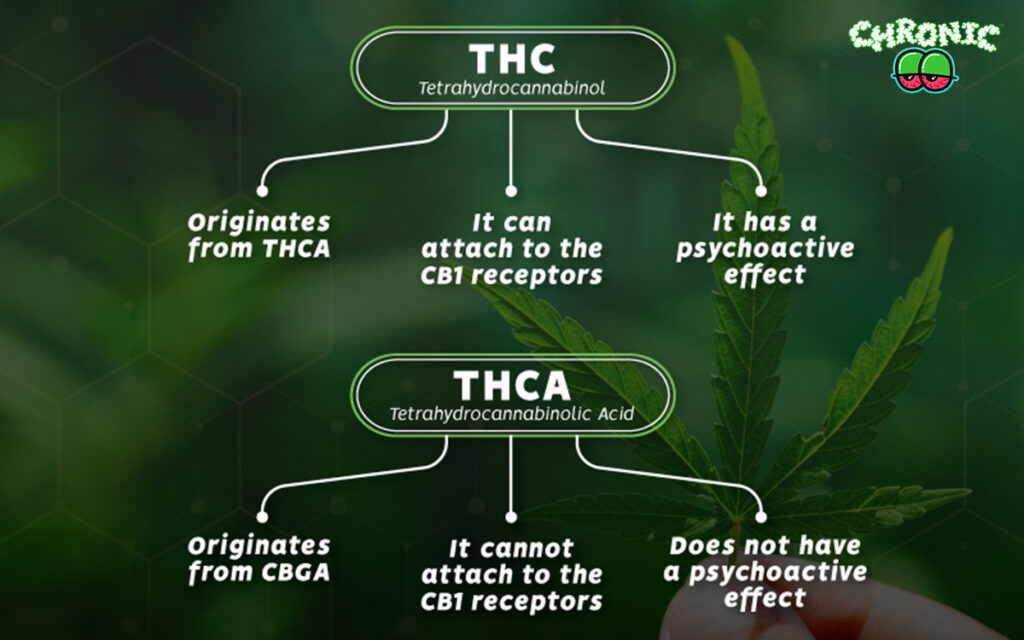
One of the most abundant phytocannabinoids in raw, unheated cannabis and a precursor to THC is THCA. Due to its nature as a very poor ligand of the CB1 receptor, this cannabinoid has no psychoactive presence. It proves to be anti-inflammatory, neuroprotective, and has anti-emetic action; thus, it could find useful application in a host of medical contexts.
THCA is only present in fresh cannabis and gets converted into THC through decarboxylation whenever cannabis undergoes heat from smoking, vaping, or cooking.
While THC has recreational and certain therapeutic uses, THCA has carved out an avenue of appeal based on its medicinal properties sans psychoactive effects.
Until now, such insight into the various differences that exist among these cannabinoids will finally allow people to make informed choices concerning cannabis products for their needs-whether it be for recreational enjoyment or for specific health purposes.
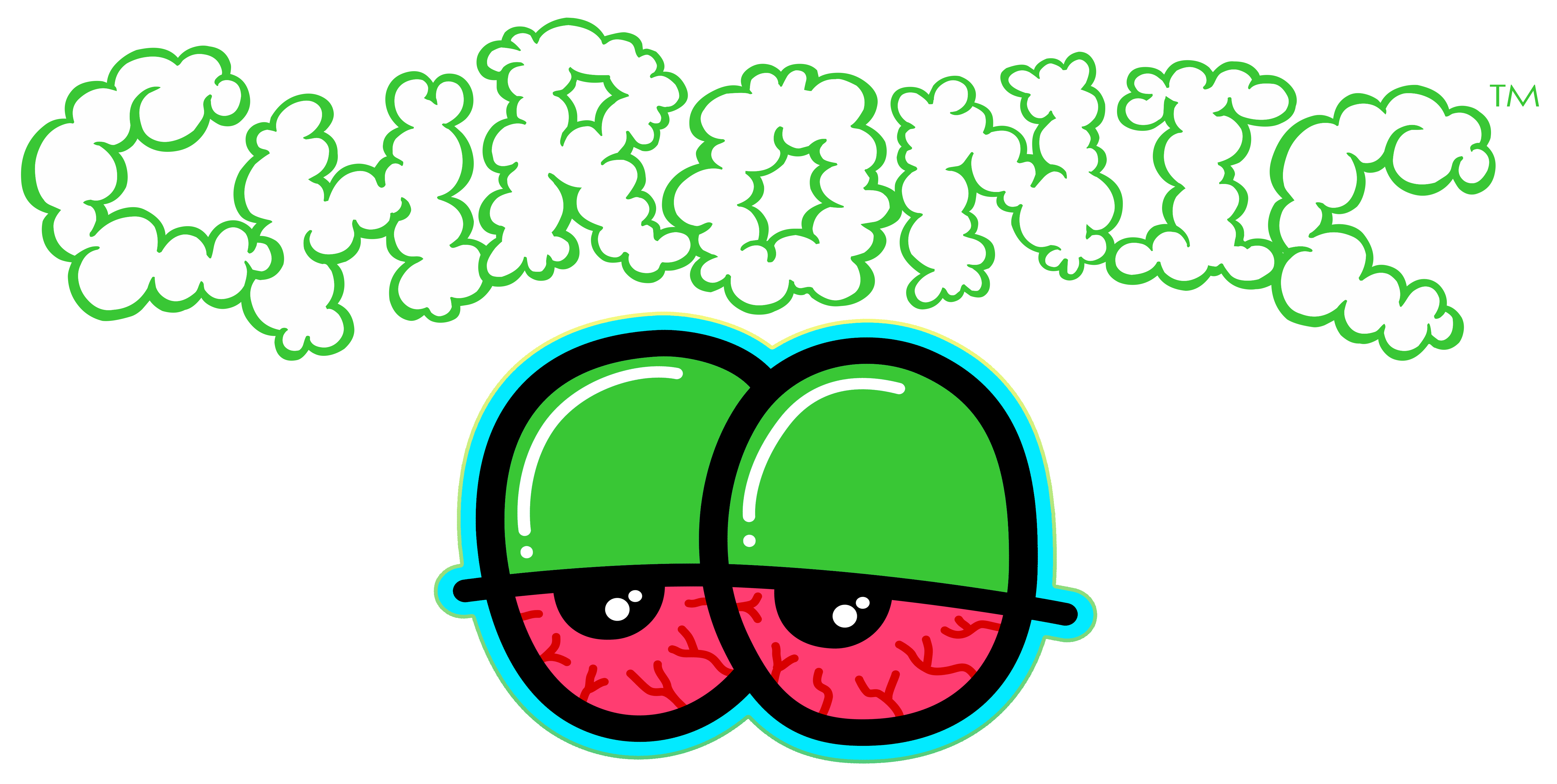
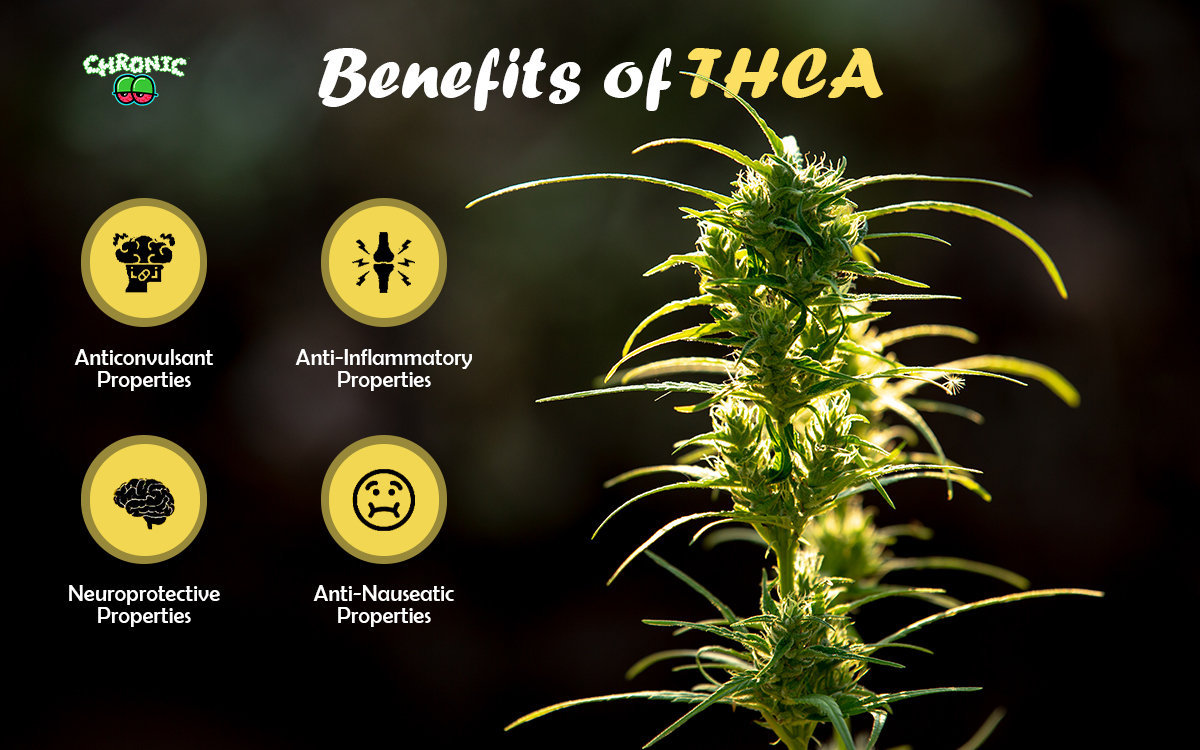
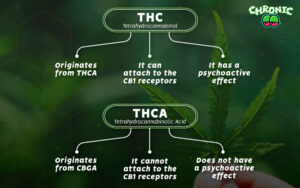

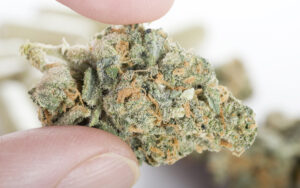
Pingback: THCA and it's Flower Production Process: How is it made? - Chronic THCA